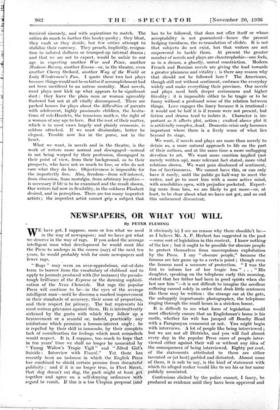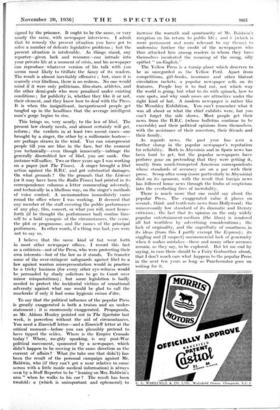NEWSPAPERS, OR WHAT YOU WILL
By PETER FLEMING
WE have got, I suppose, more or less what we need in the way of newspapers; and we have got what we deserve in the way of rags. If you asked the average intelligent man what development he would most like the Press to undergo in the course (say) of the next ten years, he would probably wish for more newspapers and fewer rags.
" Rags " may seem an over-opprobrious, out-of-date term to borrow from the vocabulary of clubland and to apply to journals produced with (for instance) the pseudo- tough '*illianee• Of the Express or the daiyning sophisti-, cation of . the Arcws Chronicle But_ rags the popular will continue to be—in the eyes of the. average intelligent .manuntil he discerns a. marked improvement in their standards of accuracy, their sense of *portion; and their respect for piivacy. The last represents- hig most serious grievance against them. He is intermittently ' sickened by the gusto with which they follow up, a bereaveineirt or -.a scandal or, indeit-d; _ practically. any misfortune' which prcimises a human-interest angle ; . he is repelled by their skill hi:innuendo, by their =complete laCk of consideration for feelings which most scoundrels would respect. It is, I 'suppose, too much to he that in: ten years' time we shall no longer .he nauseated. by " Young Widow's Tragic -.Vigil" and "'Jilted.' Girl's Suicide : Interview with Fiance." Yet theic has • recently. been an instance- in which ;the English Press has combined to shield certain perscins from distasteful publicity ; and if it is no longer true, in Fleet Street,'-,• that dog doesn't cat dog, the _pack might at least, get': together and agree on a self-denying ordinance :with: regard to vomit. If this is a too Utopian proposal (and it obviously is) I sec no reason why there shouldn't be— as I believe Mr. A. P. Herbert has suggested in the past —some sort of legislation in this context. I know nothing of the law ; but it ought to be possible for obscure people to protect themselves from unscrupulous exploitation by the Press. I say " obscure people," because the famous are fair game up to a certain point ; though even the famous need a measure of protection. " I was the first to inform her of her tragic loss " . .' . " His daughter, speaking on the telephone early this morning, stated that her father had been in good spirits when she last saw him "—it is not difficult to imagine the needless suffering caused solely in order that drab little sentences like these may be written : the strange car at the gate, the unhappily importunate photographer, the telephone ringing through the small hours in a stricken, house.
It is _difficult to see what form of legislation would most effectively ensure that an Englishman's home is his castle, whether his wife has jumped off Beachy Head with a Paraguayan economist or not. You might begin with interviews. • A lot of people like being interviewed ; but we are not all Dietrichs, and you will find almost every day in the popular Press cases of people inter- viewed either against their will or without any idea of the consequences of being interviewed. Eighty per cent. of the statements attributed to them are either • invented or (at best) garbled and distorted. Almost none of them, it is safe to say, is the kind of statement with which-its alleged maker would like to see his or her name publicly associated.
Confessions elicited by the police cannot, I fancy, be produced as evidence until they have been approved and signed by the prisoner. It ought to be the same, or very nearly the same, with newspaper interviews. I admit that to remedy the present situation you have got to solve a number of delicate legislative problems ; but the present situation is intolerable. As things stand, any reporter—given luck and resource—can intrude into your private life at a moment of crisis, and his newspaper can reproduce whatever version of his talk with you seems most likely to titillate the fancy of its readers. The result is almost inevitably offensive ; but, since it is scarcely ever libellous, there is no redress. No one would mind if it were only politicians, film-stars, athletes, and the other demi-gods who were penalised under existing conditions ; for publicity is, whether they like it or not, their element, and they know how to deal with the Press. It is when the insignificant, inexperienced people get tangled up in the headlines that the average intelligent man's gorge begins to rise.
This brings us, very nearly, to the law of libel. The present law clearly needs, and almost certainly will get, reform ; the verdicts in at least two recent cases—one brought by a singer, the other by a millionaire hostess— are perhaps straws in the wind. You can misrepresent people till you are blue in the face, but the moment you technically—even though innocently—infringe the generally discredited law of libel, you are sunk. One instance will suffice. Two or three years ago I was working on a paper (not The Times). A singer brought a libel action against the B.B.C. and got substantial dinhages. On what grounds ? On the grounds that the Listener (or it may have been the Radio Times) had printed in its correspondence columns a letter commenting adversely, and technically in a libellous way, on the singer's methods of voice control. A memorandum immediately came round the office where I was working. It decreed that 'any member of the staff covering the public performance of any play, film, concert, or what you will, must hence- forth (if he thought the performance bad) confine him7 self to a bald synopsis of the circumstances, the venue, the plot or programme, and the names of the principal performers. In other words, if a thing was bad, you were not to say so. '
I believe that the; same kind of fiat went forth in most other newspaper offices. I record this fact as a criticism—not of the Press, who were protecting their own interests—but of the law as it stands. To transfer some of the over-stringent safeguards against libel to a law against wanton misrepresentation would in practice be a tricky business (for every other eye-witness would be persuaded, by shady solicitors to go to Court over minor misquotations) ; but some legislation is badly needed to protect the incidental victims of sensational adversity against what one would be glad to call the muckrake if only it had some hygienic raison d'être.
To say that the political influence of the popular Press is greatly exaggerated is both a truism and an under- statement ; it is enormously exaggerated. Propaganda, as Mr. Aldous Huxley pointed out in The Spectator last week, is powerless without the aid of circumstances. You need a Zinovieff letter—and a Zinovieff letter at the critical moment—before you can plausibly pretend to have tipped the scales. Where is the Empire Crusade today ? Where, roughly speaking, is any post-War political movement, sponsored by a newspaper, which. didn't happen to be moving in the same direction as the current of affairs ? What (to take one that didn't) has been the result of the personal campaign against Mr. Baldwin, who (if they can't get a near relative to come across with a little inside medical information) is always seen by a Staff Reporter to be " leaning on Mrs. Baldwin's arm " when he -.walks to his car ? The 'result has been twofold: a (which is unimportant and ephemeral) to increase the warmth and spontaneity of Mr. Baldwin's reception on his return to public life ; and I) (which is more permanent and more relevant to my theme) to undermine further the credit of the newspapers who thus ,attacked him among readers in whom they have themselves inculcated the meaning of the smug, silly epithet " un-English."
The Yellow Press is a turnip ghost which deserves to be as unregarded as the Yellow Peril. Apart from competitions, gift-books, insurance and other blatant circulation rackets, a popular newspaper sells on its features. People buy it to find out, not which way the world is going, but what to do with spinach, how to cure spots, and -why snub noses are attractive under the right kind of hat. A modern newspaper is rather like the Wembley Exhibition. You can't remember what it was all about or what the chief exhibits were, but you can't forget the side shows. Most people get their news from the B.B.C. (whose bulletins continue to be execrable) and their political opinions from themselves, with the assistance of their ancestors, their friends and their family.
As regards news, the past year has seen a further slump in the popular newspaper's reputation for reliability. Both in Abyssinia and in Spain news has been hard to get, but the popular newspapers have perforce gone on pretending that they were getting it, mostly from much-trumpeted American correspondents whose standards of accuracy are on a par with their prose. Scoop after scoop (more particularly in Abyssinia) died on its sponsors, with the result that foreign news has followed home news through the limbo of scepticism into the everlasting fires of incredulity.- There is much more that one could say about the popular Press. The exaggerated value it places on second-, third- and tenth-rate news from Hollywood; the unnecessarily low standard of its dramatic and literary criticism ; the fact that its opinion on the only widely popular entertainment-mediuM (the films) is rendered all but worthless by advertising considerations ; the lack of originality, and the superfluity of smartness, in its ideas (from this I partly exempt the Express); its. niggling and (I suspect) uncommercial lack of generosity when it makes mistakes—these and many other avenues remain, as they say, to be explored. But let me end by saying, in case there should be a Fairy Godmother about, that I don't much care what happens to the popular Press in the next ten years as long as Beachcomber goes on writing for it.





























































 Previous page
Previous page